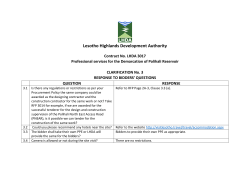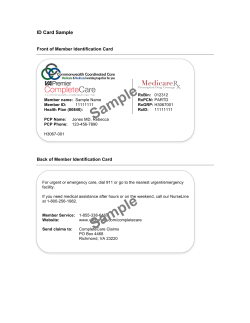
Legal Issues of Public Procurement of Innovation
Legal Issues of Public Procurement of Innovation INSPIRE-Barcelona Workshop 26 March 2015 PPI and PCP after 2014 Directives: a glance Pre-commercial Phase Pre-commercial Procurement (PCP) 1. Procurement of R&D services of innovative products/services not available on the market. 2. Excluded from EC Directives: Communication EC 14.12.2007 3. Phases: Exploring. Designing. Prototyping. Testing. No procurement phase: the procurer is not obliged to procure the resulting products/services, although it can do, through an independent tender. 4. IPRs resulting from the PCP not exclusively reserved to the procurers, but shared between procurers and bidders. Recommendation: ownership assigned to bidders and use/development rights assigned to procurers, through licences and sublicences scheme, and just for purposes linked to the procurers public mission and within their territorial scope. Innovation Partnership New! 1. Selection of a Partner aimed at 1) the R&D of innovative products/services not available on the market, to meet certain uncovered needs of the procurer ; 2) the commercial procurement of the resulting products/services provided they meet certain performance levels and maximum costs agreed in advance. 2. Procedure under Directive 2014/24: article 31. 3. Phases: 2: R&D phase and commercial procurement phase through the new competitive proceeding with negotiation (below). 4. Not risk-sharing requirement: IPRs resulting from the innovation partnership shall be regulated in the documents of the tender. Commercial Phase Competitive Dialogue 1. Procurement of products/services available on the market but not identified upfront by the procurer: to be defined during the procedure, in light of the procurer needs and the innovative solutions offered by the bidders through a dialogue with the procurer. 2. Procedure under Directive 2014/24: article 30. New cases. 3. Phases: the contractual documents can set different phases during the dialogue to shortlist the solutions proposed by the bidders, who shall be invited to file offers based on the solution finally choosed. 4. IPRs: In principle, assigned to the procurers. Page 2 © Bird & Bird LLP 2015 INSPIRE| Barcelona Workshop 26.03.2015 New! Competitive proceeding with negotiation 1. Procurement of products/services existing on the market and identified upfront, but in terms to be negotiated during the procedure. 2. Procedure under Directive 2014/24: Article 29. 3. Phases: the contractual documents can set different negotiation phases for the bidders to file successive offers. 4. IPRs: In principle, assigned to the procurers, but this point could be included in the negotiations. 10 legal issues on PCPs: The Parties 1 Procurers Joint procurement. Procurers from different Member States (MS) grouping to jointly award R&D services through PCPs co-funded by the EC (7th Framework Programme –Decipher, Unwired, Thalea, Ninfa-, Horizon 2020). Applicable law and internal organization –functions, responsibilities,…- should be agreed between the procurers. Usual appointment of a MS as a procuring coordinator, acting in the name and on behalf of the others, what allows the legal and tax regime unification. Article 39 Directive 2014/24. 2 Bidders Minimum requirements to join. Requested by PCP documents (Invitation to tender or ITT) to ensure PCP success, BUT should not prevent SMEs from participating. Flexible approach in providing evidence: technical ability (of the bidder of its employees); financial capacity (resources in kind: availability not cash) (Decipher, Unwired). 3 Consortia Possible changes during the PCP. A flexible approach allows SMEs access to further phases of the PCP exploring and exploiting synergies, being supported by ECJ case law (Makedoniko Metro case. C-57/01. 23.01.03). BUT procurer authorization requested and should not be granted in certain cases (bidders not participating at the beginning, IPRs/confidentiality issues, reduction of competition, changes in the middle of a phase, resulting bidder no longer complying with minimum requirements, etc) (Prace, Decipher, Unwired). 4 Subcontractors Subcontracting limits. PCP documents (ITT) can impose: 1) transparency obligations (declaration upfront statement on shares to be subcontracted, subcontractor identification and responsibility statements, etc) 2) certain limits to subcontracting, in addition to 7PS/H2020 geographical requirements (certain percentage should be carried out without the EU: 60%) 5 Relationships procurersbidders Communications: Digital (Procurer or PCP website; e-mail address), except for tenders proposal: no technical way to ensure their secrecy until opening. Conflicts of interests: Definition and legal consequences in ITT. Disputes: Remedies depending on the contracting coordinator legal system. Page 3 © Bird & Bird LLP 2015 INSPIRE| Barcelona Workshop 25.03.2015 10 legal issues on PCPs: The Contracts 6 Contracts scheme Diversity of contracts. Different phases governed by different contracts. 1) Framework agreement, to be signed by bidders selected in Phase 0 (Exploring) to join Phase 1 (Designing). 2) Phase contracts, to be signed by bidders selected to join each phase. Adjustments to the PCP evolvement in these contracts shall not imply an essential amendment of the initial terms of the tender (ECJ case law). 7 Contracts award Identification of award criteria, subcriteria and scoring in advance (ECJ Lianakis. 24.01.2008). 1) Price is a compulsory criterium applicable at any case (discount in the price of the services to be paid in each phase) in addition to other ones to be determined in the ITT (functionality, innovation, quality, technical, commercial and financial feasibility). 2) Possible exclusion of bidders not reaching a minimum scoring in points in one or various award criteria. 8 Prices State aids avoidance. EC Communication on PCPs of 14.12.07 concern. Price not over the market. Market price= for similar R&D services with similar IPRs scheme. 9 Payments Payments milestones. Price finally awarded to be paid in different milestones per phase (for example: signature of the phase contract/statement of satisfactory phase completion) Differences between phases with less initial investment (Phase 1: 50%-50%) and phases with higher initial investment (Phases 2 and 3: 80%-20%). IPRs Risk-benefit sharing. IPRs not exclusively assigned to procurers but shared between procurers and bidders under the scheme decided in the PCP documents. Recommended scheme: bidders assigned with the ownership of the IPRs resulting from the PCP, and procurers with use/development rights for the purposes of their public missions (licences and sublicences). RISKS OF THIS SCHEME: 10 • Risk of no competition in future procurement (Communication 2007) due to unfair advantage of the bidders holding IPRs. Solution: sublicences to third parties for implementation/development. Page 4 © Bird & Bird LLP 2015 • Risk of no exploitation of IPRs rights by bidders. Solution: Call back provision: IPRs shall return to procurers if bidders fail in exploiting them within a certain period of time (3/5 years) INSPIRE| Barcelona Workshop 25.03.2015 Thank you raquel.ballesteros@twobirds.com Bird & Bird is an international legal practice comprising Bird & Bird LLP and its affiliated and associated businesses. Bird & Bird LLP is a limited liability partnership, registered in England and Wales with registered number OC340318 and is authorised and regulated by the Solicitors Regulation Authority. Its registered office and principal place of business is at 15 Fetter Lane, London EC4A 1JP. A list of members of Bird & Bird LLP and of any non-members who are designated as partners, and of their respective professional qualifications, is open to inspection at that address. twobirds.com
© Copyright 2025








